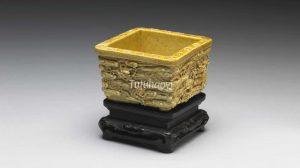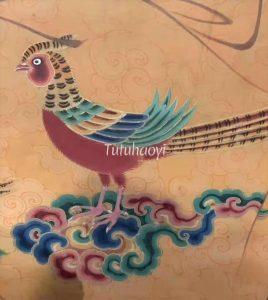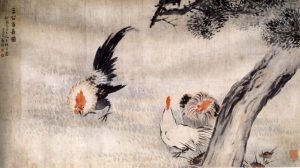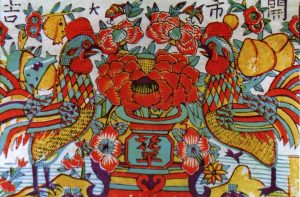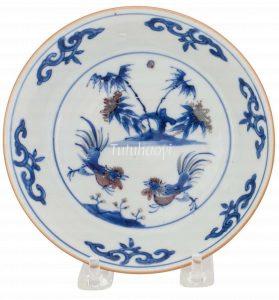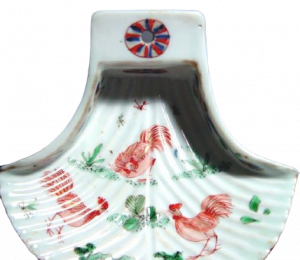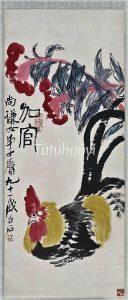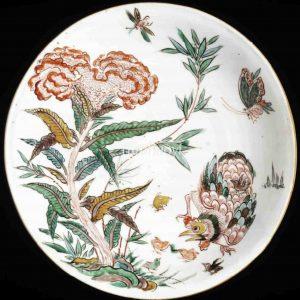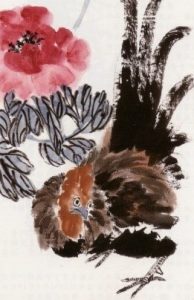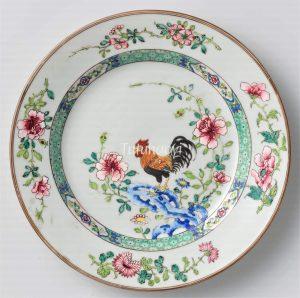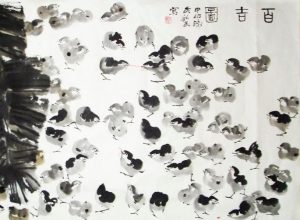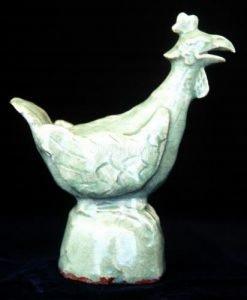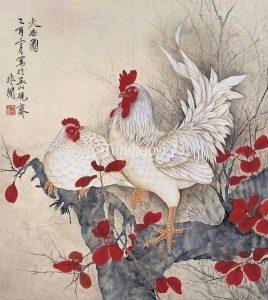Showing Results Containing
Congratulations to Dr Yibin Ni for his new findings on the Ming Potter Wu Wei and his beautiful porcelain artworks that have been collected around the world yet not properly identified. Dr Ni’s findings have contributed greatly in identifying the ...
The zhi pheasant 雉, also called Huachong 华虫 in ancient China, is one of the most popular birds depicted in traditional Chinese art. Due to its characteristic multicoloured long-tail, the pheasant is associated with the wide-ranging literary talents of the emperor. It is also used in pun rebus pictures, as ‘z...
‘San gong 三公’ are the ‘Three Top Lords in the Imperial Court’. The ‘gong 公’ from the Chinese name ‘gong ji 公鸡’ for ‘rooster’ puns on the Chinese name for ‘lord’ and three roosters in the picture represent the three top lords, which are the three top positions in the imperial court. The Chinese ...
Pun Design:
Persimmon + Chicken/ rooster/ cockerel
Punning Details:
– ‘shi 柿’ in ‘shi zi 柿子 persimmon’ is a pun on ‘shi 市 business’
– ‘大鸡 da ji’ for ‘large Continue Reading
‘Shuang 双’ is the Chinese word for ‘two’. ‘Xiong 雄’ in ‘Xiong ji 雄鸡’ in the Chinese name for ‘rooster’ makes a pun on ‘xiong 雄’ for ‘hero’. Thus, the image of two roosters in confrontation is meant to represent two competent officials competing with their intelligence for eminent gover...
‘San gong 三公’ are the ‘Three Top Lords in the Imperial Court’. The ‘gong 公’ from the Chinese name ‘gong ji 公鸡’ for ‘rooster’ puns on the Chinese name for ‘lord’ and three roosters in the picture represent the three top lords, which are the three top positions in the imperial court.
...
The saying ‘jia guan 加官’ is an abbreviated form of the saying ‘guan shang jia guan 官上加官’:
‘Guan 冠’ in the Chine...
‘Guan 冠’ in the Chinese name ‘ji guan hua 鸡冠花’ for ‘cockscomb’ is a pun on ‘guan 官’, which means ‘high-ranking official’. The crest on the head of a rooster is also called ‘guan 冠’ in Chinese. Thus, the appearance of both the cockscomb and rooster in a picture represents the auspicious...
‘Fu gui 富贵’ in ‘fu gui hua 富贵花’, literally, the ‘flower of wealth and prestige’, which is a nickname in Chinese for ‘peony’, contributes to ‘wealth and privilege’ in the saying. ‘Ji 鸡’ is a pun on ‘qi 期’, which means ‘can be expected’.
The same design may be also referred to as...
The Chinese phrase ‘Gong ming 功名’ for ‘scholarly honour or official rank’ is a pun on two Chinese characters ‘gong 公’ and ‘ming 鸣’.
‘Gong 公’ from ‘gong ji 公鸡’, the Chinese name for ‘rooster’, makes pun on the Chinese word ‘gong 功’; and ‘ming 鸣’, which ...
‘Ji 鸡’ is a generic name for cockerel, hen, and chick, and sounds the same as ‘ji 吉’ for ‘good fortune’. Thus, a picture of many chickens is used to represent ‘abundant good fortune’.
Related Pun Pictures:
A large Longquan pottery rooster sculpted on a rock sends good fortune to the receiver’s or owner’s family because da ji 大 鸡 for ‘large rooster’ sounds the sam...
The Chinese name for rooster or chicken is ji 鸡, which is a pun on ji 吉 ‘good fortune’. ‘Da’ is the Chinese adjective for ‘big’ and ‘da ji’ literally means ‘large rooster’ but puns on ‘great luck’.
Thus, these paintings convey the message ‘May you enjoy imminent good fortune’. I...
